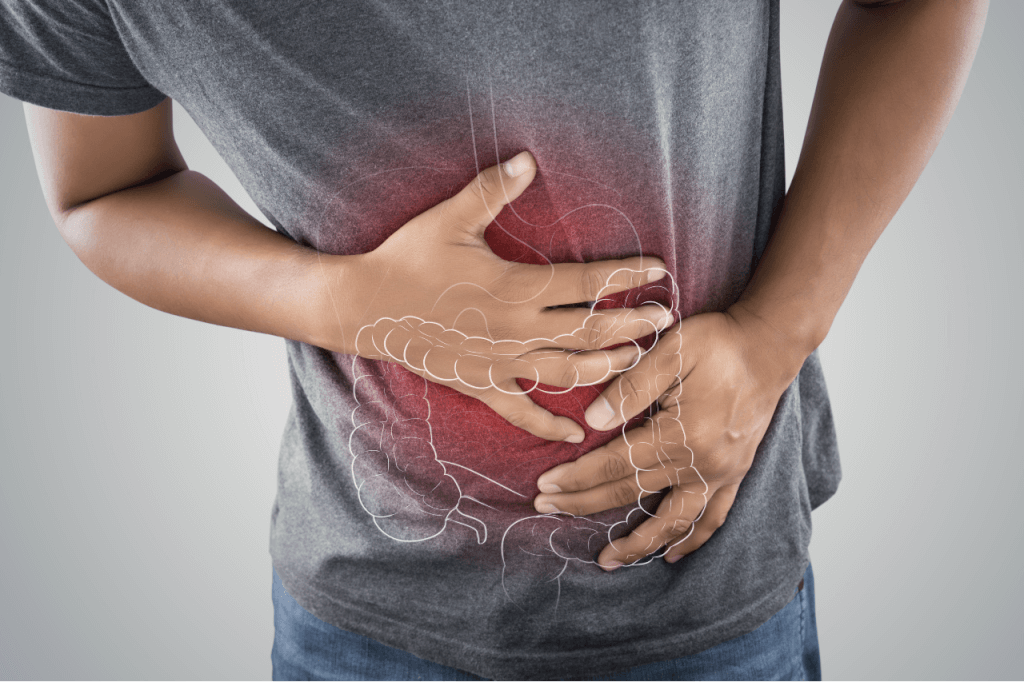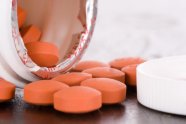Advertising Disclosure
Inflammatory bowel disease (IBD) vs. irritable bowel syndrome (IBS): What’s the difference?

Inflammatory bowel disease (IBD) and irritable bowel syndrome (IBS) are two similar but distinct digestive health problems. So what is the difference between IBD and IBS? It can be confusing. Even their familiar acronyms are easy to mix up. Many gastrointestinal symptoms such as stomach pain, bloating, diarrhea, constipation, etc. are present in both. But if you’re experiencing symptoms and suspect something’s wrong, you won’t know the difference between IBD and IBS by how you feel. Always consult your physician for a proper diagnosis. In the meantime, we’ll help explain the difference between IBD and IBS.
WHAT IS IBS?
Irritable bowel syndrome, or IBS, is a condition that relates to changes and frequency of bowel movements. The symptoms associated with IBS include bloating, diarrhea, constipation, gas or alternating episodes of diarrhea and constipation . The severity of the symptoms varies from person to person, and while some people experience continuous symptoms, others experience chronic symptoms.
WHAT IS IBD?
Inflammatory bowel disease, or IBD, is a term to describe various medical conditions that cause chronic inflammation of the gastrointestinal (GI) tract. One of the conditions that fall under the IBD umbrella is Crohn’s disease. The severity of an individual’s symptoms depends on the affected areas. Crohn’s disease occurs when inflammation and sores appear along the GI tract, affecting any portion from the small and large intestines to the mouth and esophagus. Symptoms may include abdominal pain, diarrhea, rectal bleeding/bloody stools, fatigue, weight loss, rashes, nausea and vomiting.
The other most common condition under IBD is called ulcerative colitis, or UC. It affects the large intestine, aka the colon, and the rectum. UC occurs when the innermost layer of the lining of the large intestine becomes inflamed, causing ulcers to form. The typical symptoms of someone living with UC are abdominal pain, bowel movement urgency and frequent diarrhea containing mucus or blood. The severity of symptoms depends on the location of the affected areas.
Both Crohn’s disease and UC are long-term, chronic illnesses. And both can cause destructive inflammation and permanent damage to the intestines, and an increased risk of colon cancer .
HOW DO DOCTORS DIAGNOSE IBS AND IBD?
To properly diagnose if a patient has IBS or IBD, a physician will perform a series of tests. To rule out any form of IBD, the doctor will want to take blood tests, stool tests, x-rays, MRI and CAT scans, and scoping procedures such as a colonoscopy to get a more detailed view of the GI tract . It’s also best for patients to keep an accurate log of their family history, symptoms and daily meals to see if any potential triggers could be affecting their health.
WHAT CAUSES IBS AND IBD?
Doctors are unsure as to what causes IBS and IBD. Experts believe that the causes of IBS may include stress, food intolerances or sensitivities, bacterial infections in the GI tract, or severe food poisoning. For IBD, some experts feel that it could be affected by an individual’s genes, immune system and environment . Over the years, doctors have noted a correlation between IBD and the immune system, as many patients with IBD also have an abnormal immune system. However, it is unclear if IBD causes problems with the immune system or if immune system problems lead to IBD.
HOW ARE IBS AND IBD TREATED?
Though there is no cure for IBS or IBD, there are options to help minimize symptoms. There are several medication options available for both IBS and IBD. However, there are no one-size-fits-all treatment option. Since the severity of both IBS and IBD varies, it’s crucial for patients to work with their doctors to find the best treatment option for the individual.
TREATING IBS
IBS medications include probiotics, laxatives, fiber supplements, antibiotics, Lubiprostone, or Eluxadoline. Doctors also often recommend dietary changes to help alleviate symptoms. Patients also should consider adding more fiber to their diet, cutting out gluten, and following a low FODMAPs diet.
TREATING IBD
In some cases, a doctor may prescribe a combination of medications to treat IBD. For those living with IBD, these medications could include aminosalicylates, corticosteroids, immunomodulators, and biologic therapies. IBD patients who do not experience relief after medication use and dietary adjustments may require surgery as a last option.
TREATING CROHN’S DISEASE
Patients living with Crohn’s disease may require surgery when one or more of the following complications occurs: intestinal obstruction or blockage, excessive bleeding in the intestines, fistulas, perforation of the bowel, abscess, or toxic megacolon.
TREATING ULCERATIVE COLITIS
Doctors may recommend a procedure called proctocolectomy with end ileostomy for UC patients. This procedure involves removing the colon, rectum, and anus, then creating a stoma for the ileum, or small intestine, to protrude from the lower abdomen. Afterward, an external ostomy pouch must attach to the stoma to collect the body’s waste.
Another surgical option is called proctocolectomy with ileal pouch-anal anastomosis (IPAA), though most commonly referred to as a J-pouch surgery . During this procedure, the surgeon removes the colon and rectum, then uses the small intestine to create an internal, J-shaped pouch to connect with the anus. During the procedure, the surgeon also creates a temporary ileostomy to allow the J-pouch to heal. After eight to 12 weeks, the surgeon removes the ileostomy and attaches the two ends of the bowels.





